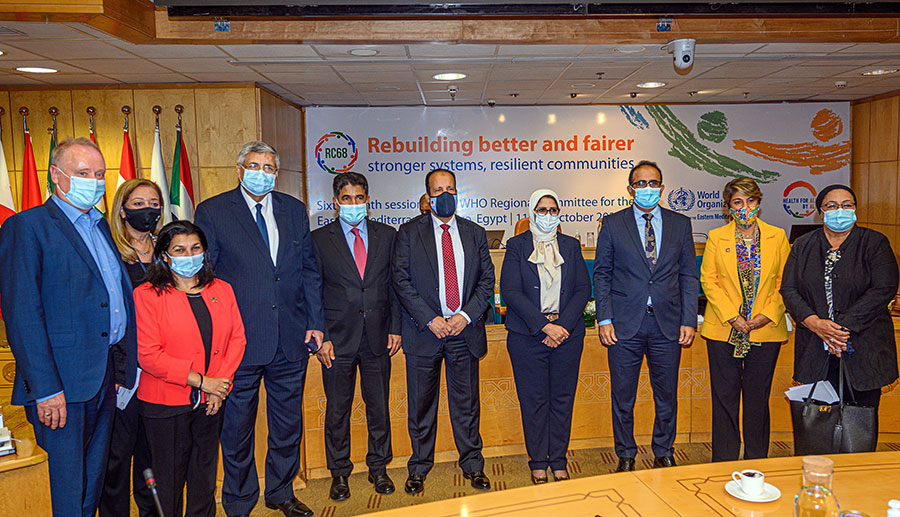
13 October 2021, Cairo ‒ The 68th session of the WHO Regional Committee for the Eastern Mediterranean resumed its session today tackling the Region’s most pressing public health issues through technical papers and panel discussions.
Today’s three technical papers emphasized key health concerns and proposed a strategy for integrated disease surveillance, a roadmap on how to build resilient communities for better health and well-being; and a strategy to address the Regional public health challenge posed by diabetes.
The morning started with a presentation on a proposed Regional strategy for integrated disease surveillance that aims to overcome data fragmentation and strengthen surveillance systems across disease-specific programmes, using a digital platform. While the topic had been addressed in previous sessions, the pandemic emphasized its criticality and the urgent need to implement the strategy and aim to roll it out by 2025.
At the core of this year’s theme ‒ Rebuilding better and fairer ‒ the second technical paper proposed a roadmap to strengthen community engagement and promote resilient communities. The discussion highlighted the importance of community engagement for more effective public health interventions, and the need to establish clear governance structures to enable and empower communities, using a multisectoral approach. It was agreed that engaging communities is a two-way process that best succeeds with the full involvement of both communities and government.
While COVID-19 has overwhelmed health systems in the last two years and shifted focus from critical health concerns, a paper was dedicated to shedding light on the considerable regional burden of diabetes, its related risk factors and disabling complications. The Eastern Mediterranean Region has the highest prevalence of diabetes worldwide. Poor clinical management of diabetes is leading to major complications, including blindness, renal failure, and amputations. Improving diabetes management can have substantial impact on decreasing rates of premature mortality. In order to better prevent and control diabetes, the paper proposed that Member States adopt a comprehensive regional framework, and adapt it to countries’ context.
Also in line with the theme, the technical agenda was complemented with two panel discussions inviting high-level public health leaders to share their wealth of experiences. The first panel discussion - ‘Shaping the future of health systems in the Eastern Mediterranean Region: advancing the dual goals of universal health coverage (UHC) and health security’ ‒ aimed to debate approaches towards building resilient health systems in the Region. The panelists also shed light on the policies and actions needed from Member States, WHO and other development partners to shape the future of health systems in the Region to advance both UHC and health security.
The second panel discussion, titled ‘Build back fairer: achieving health equity in the Eastern Mediterranean Region’, drew attention to the urgent need to address widespread inequities in health and development within and between countries in the Region and exacerbated by the COVID-19 pandemic. The discussion aimed to inform Regional Committee participants on the findings and recommendations of the Commission on Social Determinants of Health in the Eastern Mediterranean Region; encourage prioritization of evidence-based actions to reduce health inequities in the Region; and discuss the operationalization of the Commission’s recommendations.
The Regional Committee will conclude its session tomorrow, with a review and endorsement of resolutions on the priority issues discussed during the 68th session.
For more information
Mona Yassin
WhatsApp: +201006019284


